Peter MALONE
Saturday, 18 September 2021 19:45
Buster and Billie
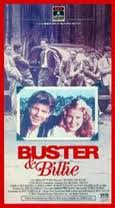
BUSTER AND BILLIE
US, 1973, 99 minutes, Colour.
Jan- Michael Vincent, Joan Goodfellow, Pamela Sue Martin, Clifton James, Robert Englund.
Directed by Daniel Petrie.
Buster and Billie is a love story and it is not sentimental or cliché-ridden, although the familiar ingredients are there. The advertising said that 'it should have been a love story'. They are alluding to the violence, especially at the end of the film. The film has received an R Certificate here. Probably it is for the final violence, perhaps it is for some snatches of nudity. On the whole, it is a pity that the film has this certificate because it would be of great interest to many adolescents from about sixteen to eighteen.
Buster and Billie is set in Georgia, 1948, which means that it also has the flavour of nostalgia, another popular feature of recent films. The rural Georgia setting gives the film a sense of reality and some credibility to its characters and plot. But the main reason for recommending the film is the presentation of the relationship between Buster, who is a school hero in his final year and expected and expecting to marry the school's sweetheart, and Billie, the poor, shy girl who is the butt of the boys' lewdness and the girls' disdain. The two seem an unlikely pair, but the merit and quality of the film is that the beginnings of the relationship and its gradual transformation into genuine love are most moving and telling. It is in the detail of the relationship that the insight comes. It is one of the best pictures of genuine adolescent love in recent films.
Jan-Michael? Vincent, an average actor, is seen here at his best. Billie is played by newcomer Joan Goodfellow. The film runs just over an hour and a half and so is most useful for some serious discussion about the meaning in life.
1. The appeal of this film and the audience for which it was made? How well did it work within the nostalgia genre? The appeal of the late 'Forties and their interest? Exploiting the themes of the time or presenting them in thematic form? Could this story have been told of any time and place?
2. The appeal of the love story? The basic nature of its appeal, how real was this particular love story, the authentic aspects?
3. The youth orientation of the film? Did it exploit this, explore it well?
4. The opening in 1948 and Georgia: the presentation of the scene in a cinematic way: the cattle, the farms, school, the bus, roads, clothes, the kind of talk, the toilets, the records, down at the creek, the drive ins, Slim Mim's dance, the day at the beach etc? How serious was the attention to detail? What did it contribute to the atmosphere and authenticity of the film?
5. The picture of young men and women in the late 'Forties? The style of manners of the time and the influence on the young people's behaviour for example, to parents, to teachers, to each other, at Church, on dates? Public manners and private manners? Sincerity, consistency, authenticity?
6. The contribution of the music, the local melodies and lyrics? The background music, especially the use of Billie's theme? The pathos at the end?
7. How attractive a hero was Buster? The qualities of Jan- Michael Vincent's performance? The details of his home life, going to school in his truck, his reputation and personality at school.. his good qualities, his faults? His strength of character, relationship with the boys, the detail of his friendship with Whitey, the expected relationship with Margie, love, sexuality? His lack of interest in Billie, change of interest? What was the quality of his response to Billie, The detail of attention to her, the change into love? The impact of his breaking with Margie? Taking Billie to Church and the contrast with Margie? The confrontation with his parents about Billie? The lyrical interludes of their outings, their mutual gifts? The impact of his grief at Billie's death? The credibility of his running amok? The picture of an ordinary boy leading an ordinary life and tested by suffering? Could audiences identify with Buster as a hero?
9. Billie as heroine? The conditions of squalor, her family, her being used down at the creek and her impassivity? Her difficulties of relating, at school? Her shyness in Buster's regard? Her enjoyment of his company, changing into love? The gifts of the bottle and the opener? The going to Church, the going to the drive-in, going to the dance, sunrise? writing his name in the sand? The horror of the gang pursuing her, the violence of the rape and death? The pathos of her death? Was she a credible character?
10. The contrast with Margie as the all-American heroine? The detailed presentation of her life and family at home, her friends at school, Sally, her relationship with Buster and her resistance sexually, her ignorance? Church, the impact of Buster's breaking off the relationship?
11. Whitey and his role at the school, as an albino, as outcast, seeking friendship from everyone? The genuineness of Buster's friendship, the visit to his home. the exhilaration of the day at the seaside, the hat? The credibility of Whitey's going with the group and siding against Buster?
12. The other boys: Warren, Smitty? Their types, youth in the late forties, attitudes to sex, Drink, being daring? The group cohesiveness, the poolroom? Their bravery when together? Their fears? The brutality of the death and their pretence? Did they deserve Buster's violence?
13. The impact of the sexuality, the gang rapes, the responsibility and shirking responsibility, the boys' deaths?
14. The characterization of the parents, Jake, the bus driver? How did they throw light on Buster and Billie?
15. The attitudes of the police in the case, especially with the flowers?
16. The significance of the ending and Buster's going to the cemetery, Billie's theme?
17. How much insight into the quality of life, youth, love, death and the influence of the consequences on life?
Published in Movie Reviews
Published in
Movie Reviews
Tagged under
Saturday, 18 September 2021 19:45
Buster Keaton Story, The
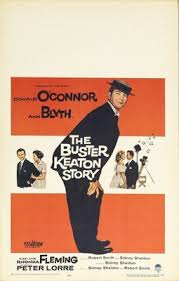
THE BUSTER KEATON STORY
US, 1957, 91 minutes, Black and white.
Donald O'Connor, Rhonda Fleming, Ann Blyth, Peter Lorre, Larry Keating, Richard Anderson.
Directed by Sidney Sheldon.
The Buster Keaton story is a modestly entertaining film about the great deadpan comedian. Commentators say that it does not necessarily reflect the details of his life. However, it highlights his vaudeville background, his entry into films and re-creates many sequences from his classics. It is an interesting evocation of Hollywood in the '20s, during the transition to sound, the early sound era.
Donald O'Connor is effective in the central role, especially with his acrobatic re-creation of Keaton's famous scenes. Ann Blyth is an attractive heroine. Rhonda Fleming has a guest role as an opinionated star. There is a momentary glimpse of Cecil B. de Mille whom Keaton does not recognise.
The film was co-written and directed by Sidney Sheldon. He had won an Oscar for The Bachelor and the Bobbysoxer in 1947. After a career in writing for screen and television, he moved into great success in writing bestsellers. The musical score is by Victor Young.
1. An entertaining film? Portrait of Buster Keaton? Of vaudeville and the transition to cinema? The times?
2. Black and white photography? The re-creation of old Keaton films? The use of silent techniques ? and the way that these were acted and filmed? The evocation of Hollywood? Musical score?
3. Audience interest in Buster Keaton? His impact in his time? Silent movies? Comedy, mime, pantomime? His later career? The background of his personal life? The portrait of a star and the familiar ingredients of self-centredness, success, failure, being loved and failing to return the love, drink?
4. Donald O'Connor's portrait of Keaton? The attempts made to make him look like Keaton? His vaudeville background? Hitting his head? The long years on the trail? His going to Hollywood? Getting into the studio? Meeting Gloria? Meeting Kurt? The humiliation when he acted the scene? His being employed by Lawrence Winters? The devotion of Gloria ? outings, style, his not recognising her love until too late? His attraction to Peggy Courtney, her use of him, the meal out and his bad manners, her engagement and his party? Success, the card-playing sequence and the good comments? His contract and starring and directing? His buying the mansion? His butler? Relationship with the studio? Greater success? Drinking? The failure of the romance? His sinking his money into films? Not recognising the transition to sound? His films failing? His drinking, Gloria marrying him, the strained life at home? Refusing a role in a talkie? His failure in understanding talkie techniques, his poor pronunciation? His playing baseball with the kids? His decision to go back to vaudeville? Success? Gloria joining him? An interesting portrait?
5. Gloria and her skill as Casting Director, the early encounters with Keaton, her low opinion of actors, loyalty to Winters, friendship with Tom? The outings with Keaton? His engagement to Peggy? Her going abroad? Her return he announcement of the engagement, her calling it off, rescuing him from prison, the marriage, housekeeping for him, her inability to save him, her joining him for the vaudeville act?
6. The Hollywood hierarchy, the sympathetic director, the agent, Kurt and his humiliating him on the set, trying to direct him in the talkie? The stars and their glamour? Peggy Courtney and her using people, her
engagement?
7. The film's comment on actors and their self-centredness? Their talent, self-assurance on the surface, interior insecurity?
8. The glimpse of Hollywood, film techniques, silent styles? The skill in Keaton's timing, acrobatics, sense of nonsense ? but with the deadpan face?
Published in Movie Reviews
Published in
Movie Reviews
Tagged under
Saturday, 18 September 2021 19:45
Busting
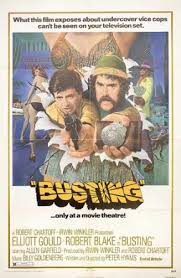
BUSTING
US, 1973, 92 minutes, Colour.
Elliot Gould, Robert Blake, Allen Garfield, Antonio Fargas, Michael Lerner.
Directed by Peter Hyams.
A trend tends to become a fashion and then it becomes commonplace and overdone, which is what has happened by now to the police genre so popular in the early 70's. This film, from its title, is clearly such another film, its synopsis tends to run to formula: twosome, relentless pursuit of criminals, a look at the city's low and lowest life, corruption in high places, persecution of the heroes. This was one of the better examples and one of the most rugged, but it got lost in the crowd. Its success depends on its rather relentless keep on moving style and the personalities of its twosome, Elliot Gould and Robert Blake.
1. Was this a successful police saga? How successful within the genre of police action thrillers? Why? How well made was it in terms of acting and style, location photography, musical background?
2. What audience response does a film like this presuppose? As regard action thrillers, as regards honesty versus corruption, as regards heroes trying to do their best?
3. Comment on the presentation of the Los Angeles world. The opening with Jackie and her visit to the dentist, her apartment and being busted? The details of the precinct, the police there, the interactions of the police amongst themselves? The atmosphere of crime and its control in Los Angeles, Rizzo and his house, family henchmen, crimes? The ugly world of Los Angeles, the bars, the strip joints, the park and lavatory duties, etc.? How important was this for the film and the creation of atmosphere for response? Did this seem a real world? The importance of a shoot-out in a supermarket? Audience identification with this?
4. Were the heroes heroic in themselves? Were they easy to identify with? What were the main qualities of Michael Kenelly? The main virtues of Farrell? What kind of life did they have for themselves? How much was their life subjected to their career and job? The nature of their honesty and sense of justice? Why were they so earnest? Could their tactics always be approved of? Audience response to the brutality of their being bashed? Did this make their relentlessness intelligible? Why did they work well together? How important was the picturing of this teamwork?
5. Did the character of Rizzo give an understanding into the mind of the modern criminal? His hypocrisy, protection by the police? His home life, his work, and the ugliness of the joints he ran, his pressures on people? If the law could not touch him, who had the right and duty to stop him? Private citizens or police? Why?
6. How did the film work on audience sympathy for police as men, in a hard job with opposition, corruption in the force, the imposing of justice and law?
7. How cunning was Rizzo in his hospital tactic? What else could the two men do? The insolence of Rizzo saying that he would get only a short sentence? The frustration for the police? What emphasis did this give to the end of the film and audience response?
8. How much value is there in this portrayal of police life and work and American crime? As entertainment? As a social document? As insight into American Society?
Published in Movie Reviews
Published in
Movie Reviews
Tagged under
Saturday, 18 September 2021 19:45
Bustin' Loose
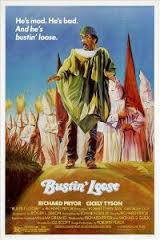
BUSTIN' LOOSE
US, 1981, 88 minutes, Colour.
Richard Pryor, Cicely Tyson.
Directed by Oz Scott.
Bustin' Loose is a Richard Pryor comedy. He produced the film, wrote the original story and stars in a mixture of his clowning style and Sidney Poitier in To Sir With Love. The film (echoing Pryor in Stir Crazy) is about a conman criminal who is asked to exercise his parole driving a bus of misfit children across America. He is in the company of a rather prim social worker played by Cicely Tyson. The inevitable happens: they fall in love, they charm the children, they get to their destination which is more than they hoped for, they get the money needed for their farm by tricking confidence men and money schemes. It is all too good to be true but quite entertaining in its way. The film has all the ingredients of humorous/sentimental liberalism and relies on this for its charm. On a popular level, it works quite well.
1. An enjoyable comedy? Human interest? A piece of Americana?
2. The film as a Richard Pryor vehicle? His frantic comic style, blended with more quiet touches and sentiment? Pryor's involvement in the whole film? His standard routines? His being matched with Cicely Tyson to give the film a romantic touch?
3. The tradition of the road film: the bus touring America, the cross-section of states, of people, situations, locations? The possibilities for comic touches? The panorama of America?
4. The introduction to Pryor's character: Joe - robberies and the elaborate failure of stealing the television sets? His going to court and his frantic behaviour and acting up to the judge? The reaction of his parole officer? The parole officer putting pressure on him ? the fixing of the bus? The introduction to Vivienne and the kids?
5. The contrast with Vivienne and her teaching, her care for the handicapped and the maladjusted children? Lack of funds, the threat of closure? The getting of the bus? Her invincible determination to get to Washington State? Her personal style and manner compared with that of Joe? Her relationship with Donald and his suspicions throughout the film?
6. Joe facing the situation: initial introduction to the kids and their range of difficulties and disabilities? The bus and its chugging along? The variety of stops and the squabbles about motels, rooms. supervision and the difficulties with the kids? The kids running away and Vivienne's desperation? Ice's gradually charming the kids and getting to know them, affirming them? The fishing sequences and the falling in the lake? The sticking in the mud and the help given by the Ku Klux Klansmen? The playing of strip poker? Ice gradually learning of the problems? The kiddie who wanted to drive the bus and crashing it? Donald's pursuit of Joe and his growing suspicions and antagonism?
7. The film's sentiment: relating to each of the children? Vivienne's change and learning to like Joe. fall in love with him?
8. Cicely Tyson and her stuffy style? Determination, pushing Joe and making demands of him e.g. at the motels? Her falling into the mud and into the lake and being able to laugh at herself?
9. The passing through the range of locations, through the mountains, the arrival in Seattle? The pleasant situation of the farm? The discovery of the difficulties about the bank? Vivienne trying to raise the money?
10. The humour of the encounter with Dr. Wilson T. Renfrew and his assistant? Their confidence tricksterism about raising money? Richard Pryor's comedy routine in Joining, seeming to help them and rob them? The elaborate chase and smash-up of the shop?
11. Donald pursuing Joe, demanding him back, the confrontation with Vivienne? His giving in and the happy ending? How well did the film sketch in Joe and Vivienne and their relationship with each of the children?
12. The emphasis on the children and their disabilities, learning to cope, what they taught each other, what they taught Joe, what he taught them? The popular ingredients for sentiment and comedy?
Published in Movie Reviews
Published in
Movie Reviews
Tagged under
Saturday, 18 September 2021 19:45
Butch and Sundance: The Early Days
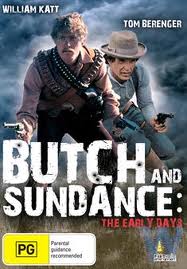
BUTCH AND SUNDANCE: THE EARLY DAYS
US, 1979, 112 minutes, Colour.
William Katt, Tom Berenger, Jeff Corey, John Schuck, Arthur Hill.
Directed by Richard Lester.
The gamble to produce a follow-up to the classic Newman-Redford? western. Since they died, the only way to anticipate is a prequel! It has paid off nicely in this genial look at the west and its would-be heroes. Tom Berenger and William Katt do well (though somewhat strainedly) and resemble Newman and Redford respectively more than a little. The locations, seasons, interesting details of the way of life of the west, are expertly captured by director Richard Lester (not so tricksy in style as usual). The screenplay echoes nicely the whimsy and action of the original without trying to outdo it. All in all, pleasant entertainment, well done.
1. The popularity of the original film? The stars? The decision to make a prequel ten years later? Aiming at popularity, aiming at understanding the heroes and their myths? The treatment of the original compared with the second film? The heroes of the 60s and the myths? The treatment of them in the late 70s?
2. The function of sequels - giving audiences more about the characters, the styles and situations? Sequels trying to outdo the originals? Drying up the original impulses and inspiration? How did this sequel function? The idea of a prequel? Not attempting to outdo the original?
3. The modest approach of the makers of the film: the build up of the characters, the parallelisms of the plot with the original, the scope of the early years of the two heroes? The establishment of the characters, their meting, their introduction to robberies, their hankering after myths, the beginnings of their career? The presentation of the West ? the wide open spaces as well as the small waterlogged towns and the orchard farm? The importance of the stars and their similarities to Paul Newman and Robert Redford? On this level, how successful was the film?
4. The film's portrait of the West: the atmosphere of the prisons, the Governor's mansion? The towns, water, saloons, farms and houses, hovels in the countryside? The Hole in the Wall hovel? The range of landscapes and their use? The mountains, the plains, the farming lands? The use of the seasons for the passing of time and the range of beauty, the dangers to people in the West especially during the winter? The attention to details of shops, homes, work? The characters within these locations ? e.g. Butch and his work as a butcher, his home, the details of the robberies especially in the saloon. the jails, the courts? A feel for the real West? The highlighting of the need for heroes?
5. The musical score and its variety of range? The music suiting the variety of moods of the film?
6. The actors and their looking similar to Paul Newman and Robert Redford? Their manner? The continuity thus gained with the original film and its effect on the audience? The skill of the two actors in themselves in portraying their roles? Establishing the credibility of Butch and Sundance and their consequent actions and career?
7. The introduction to Butch ? the impact of his personality, leaving prison, his promises to the Governor and to the Sheriff? His involvement in action? His return home and his companions thinking that he had betrayed them? A gentlemanly type of the West, his friendship with Harry Longbaum? His ambitions to be an outlaw? His idolising Mick Cassidy? His capacity for thinking and planning? The possibility of an outlaw future?
8. The contrast with Harry Longbaum? Seeing him at work in the saloon, his failure and the need for Butch's help, his skills with the gun? The posse and the siege? (And the humour of the posse refusing to go on ? and the contrast with the obsessive pursuer who ultimately confronted them?), Butch and Sundance and their initial clashes, their discussions about themselves and their hopes, the discussions about the names that they would take? The importance of the stories circulating about them? Both of them as heroes for the future?
9. The nature of the bonds between the two, their being similar, different? Butch and the thinking, Sundance and the action? Their robberies and the humour of their execution? Their putting up at the hotel and enjoying wine, women and song and gambling ? and boredom? The tension with the pursuit by O.C.? The decision to take the vaccine to the diphtheria patients? Situations of life and death especially in the snow? Butch helping Sundance and his wounds, Sundance and the confrontation with O.C.? Their work together as an effective combination?
10. How well did the film sketch the character of Butch? The impact of his being released from jail, his promises to the Governor, the friendship with the Sheriff even to the court case? His promises? His buying the necessities of life, the sequence at the casino. joining the posse, the meal on the mountain. the friendship with O.C. and the gang and O.C.'s arrest, his escape? The introduction to him as a character, the humorous touches and details?
11. The character of Sundance, especially as illustrated at the casino, in the siege. the meal with Butch, the further jobs? The humour of the robbery with the skunk, the punches, becoming an outlaw? Enjoying wealth?
12. The character of O.C., prison, his escape, the pursuit, the shooting, the sequence with the barber, being deaf, the confrontation in the muddy street and his death? The effect on Butch, the effect on Sundance and his regrets? Butch explaining the harsh laws of the West and indications of the future?
13. The sequences in the snow, the diphtheria people, the learning to ski with its humour?
14. The contrast with Spring, Sundance and his wound? His waking up to Mary, his discovery of Butch's family life, the boys and Sundance's stories about Butch Cassidy as hero? Mary and her patience? Butch at work as a butcher? The pressures on him to leave? O.C.'s confrontation and death? His having to move on and Mary's accepting of this? The portrait of the patient woman of the West and her children?
15. The ambitions to free Cassidy, the robbing of the bank, the court case, the Sheriff? The posse leader and his vengeful pursuit?
16. The would-be outlaws and their assistance for the train robbery? The elaborate attention given to the strategy, the detail of the robbery? The humour of the plan and the fact that such a robbery could be achieved by two young men? The humour of their escape to mythology?
17. A genial portrait of the West? The audience knowledge that their lives would be short and that they would die violently? The presentation of the more ordinary life in the West and the significance of western legend?
Published in Movie Reviews
Published in
Movie Reviews
Tagged under
Saturday, 18 September 2021 19:45
Butley
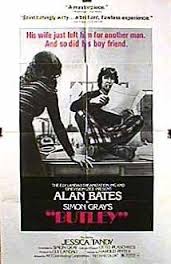
BUTLEY
US, 1973, 130 minutes, Colour.
Alan Bates, Jessica Tandy, Richard O'Callaghan, Susan Engel, Michael Byrne.
Directed by Harold Pinter.
Butley was a surprise. When an audience participates in verbal and emotional lashings like those portrayed in this film (the Virginia Woolf variety), it usually expects a final relief, a catharsis of insight and emotional release as the protagonists move towards some understanding. Not so here. The fighting remains at the level of smart, petty (and frequently funny) bitchiness. No catharsis; just the pessimistic realisation that the characters are hurt, but will continue to behave like this in the next phase of their lives. Alan Bates as Butley brings a fussily-mannered style to the role which irritates and then makes one realise that he is playing the role perfectly.
1. How important is the concept of the American Film Theatre; the presentation of successful plays to wide audiences? The validity of the play, its emphasis on its words, etc.?
2. How good a play is Butley? The quality of the dialogue, the breadth and depth of the characterisations, the sharpness of the situations, the nature of the conflicts, stylised presentation of human interactions?
3. How successful was this film as a film adaptation of a play? While keeping the main qualities of the play? What features were most striking? What were the particular features of adaptation from stage to screen?
4. How important was the quality of the acting for this film's impact? The centrality of Alan Bates, his style, his living the character of Butley?
5. How important was the film's central focus on Butley; that he was to be liked to disliked, that he was a character and also a caricature, that he had depths of feeling and conflict, that he had surface cynicism and superficiality, that he was human being in his eccentricities, faults, cruelty, needs? which sequences best illustrated Butley as this complex human being?
6. The importance of the beginning and the end? The revelation of Butley as he shaved, his room, home, person, style? The fact that he was left alone at the end? Butley as an alone person?
7. What kind of a man did the film show Butley to be? The importance of his relationship with Keystone, the fighting, possessiveness, the bitchiness? The contrast with Butley's relationship with his wife? Butley as thinking he was superior yet not knowing all that was going on around him? As a catty person, pressurising, dramatising everything, and yet violently defeated? Was Butley in any way a tragic figure or merely pathetic?
8. The presentation of Butley as husband? His marriage as an interlude in his relationship with Keystone? His disregard of his child? The quality of his relationship with Ann? Did he love her at all? What was revealed in their encounter in his room? What kind of person was Ann? Why had she married Butley?
9. The quality of the relationship between Butley and Keystone? The homosexuality? Was there any love between the two? Had there been? The atmosphere of their encounter as the end of the affair? Had both merely used each other? or had there been something more? Why did the break-up take this particular tone? Did Keystone want to hurt Butley? Butley hurting Keystone?
10. The drama of the encounter with Butley and Reg? Butley's disadvantage in not knowing what was going on, yet his superior assumptions over Reg? His spurning of Reg before Reg appears? The impact of the truth on him? The hurt?
11. What dramatic impact did the sequences between Butley and Edna have? The background of Butley's academic career? His style in his work? As a university type but going to seed and lazy? Moving in a world of unreality? Did Edna live in a world of unreality? Would Butley become like Edna?
12. The dramatic finale of the encounter between Butley and Gardiner? Gardiner being used in Butley's conflicts? The possibility of a new beginning? Butley not being able to be bothered? Why?
13. How pathetic was the picture of Butley as an academic gone to seed? His bitchiness with Edna, his not doing any work, avoiding tutorials, the way he spoke to James on the phone, the girl with her essay on 'A winter's Tale', his continued non-achievement? The possibility of a study of T.S. Eliot? His quoting of Eliot cynically? Was this in any way the effect of the academic world, or was Butley as a person mainly to blame?
14. The presentation of Butley as arrogant, unfeeling, defensive? Especially the encounter with the girl at the tutorials?
15. Did the film give any insight into Keystone? Or was he merely a foil for Butley? His average abilities, being favoured by Butley, his rise in the department, his ambitions for promotion, moving into a new room? How mediocre a person was Keystone?
16. what kind of person was Reg? The balanced presentation of a homosexual character? The relationship between Keystone and Reg?
17. The insight into Edna? As a single academic woman, older, in fear of the students, yet dominating? The old maid and Butley's possibility of becoming an old maid?
18. The importance of Ann as a person? How well was she explored?
19. The student and her essay and her tutorials? As a portrayal of a typical, keen university student? Was her essay bad? Did the audience agree with Butley in his assessment of her or not?
20. Gardiner and his potential as a student? The play on his emotions and ambitions by Butley's whims?
21. What had been achieved by the end of the film? The film worked on the superficial and smart level of wit, bitchiness. Did it achieve any depth below this surface? Did audiences respond to a deeper surface?
Published in Movie Reviews
Published in
Movie Reviews
Tagged under
Saturday, 18 September 2021 19:45
But Not For Me
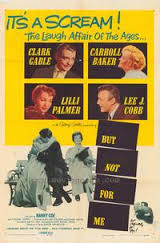
BUT NOT FOR ME
US, 1959, 105 minutes, Black and white.
Clark Gable, Carroll Baker, Lilli Palmer, Lee J. Cobb, Barry Coe, Thomas Gomez.
Directed by Walter Lang.
But Not For Me was one of Clark Gable's last films. After leaving M.G.M., where he worked for many decades, he appeared in a number of light pleasant romantic comedies with the leading actresses of the day e.g. Teacher's Pet with Doris Day and It Started In Naples with Sophia Loren. Carroll Baker at the beginning of her career is an attractive heroine and was a better actress in her earlier years than later. Lilli Palmer as his wife has a good opportunity for light satirical comedy. Lee J. Cobb appears as an unlikely play writer. The film based on a play by Samuel Raphaelson, was made in the 30s as Accent on Youth and also in 1950 as Mr. Music with Bing Crosby. It treats the old theme of the older man falling in love with the younger woman and the romantic and disillusioning repercussions. Direction is by Walter Lang who made many films of this kind in the 40s and 50s. Pleasing light entertainment.
1. An enjoyable film, the romantic themes, popular cinema material of each decade? The film in its origins as a play, the remakes?
2. The world of New York, theatrical offices? The black and white photography, the score, the Gershwin theme song?
3. The crisp dialogue, the humour, irony, satire? The conventions of this type of satiric romantic comedy?
4. The atmosphere of the theatre., a film about a play commenting on real life? The ironies in this structure? The relationship of dramatics to real life and people's blindness to this? The significance of the title, to whom did it refer, why?
5. The old story of the ageing man falling in love with the young girl? How well did the stars carry this off, the quality of the writing, the dramatics? The irony of the life situation echoing the play and even entering into the play's dialogue?
6. Clark Gable and his perennial popularity, style, age? His portrayal of the theatrical hustler and his success, lavish? His push? His secretary and her being taken for granted? The reason for his marriage to Kathryn and the divorce? His reliance on Mac for a successful play? His putting off of his lawyers? His reliance on his image? Elli and her devotion to him and her romantic scene? His flattery, his using her lines? His involving her in the writing,, the rehearsals? Her being the star and his fostering of her success? The importance of his realisation of what had happened, his lying about his age, his need for decision? His allowing her an option and his dismay at her choosing against him? His having to cope? His bond with Mac, the reconciliation with Kathryn? The happy ending? A Clark Gable type - enjoyably done?
7. Carroll Baker's performance as Elli? The devoted secretary, her acting career, her love for Roger? Her infatuation with her boss, the impassioned speeches, her devoted work, the outburst in the rehearsal and her taking over the performance? Her scruples about pushing herself? The play, the lack of success, her rise to stardom? Her continual proposals? Kathryn and her continued taunts? Roger and his pursuit of her, his plea for her to marry him? Her mixed feelings? The final breaking away from Russell? The wedding and its immediate precariousness? The framing of Russell for a possible divorce? The reconciliation? A credible character contrived for the purposes of the themes?
8. How attractive a personality was Kathryn? The divorced wife, her devotion to her ex-husband,, successful? Her helping out financially, her taunting of Elli in order to win back Russell? Her being in at the end?
9. Mac and his creativity, his drinking, his participation in the writing, rehearsals? His playing matchmaker at the end?
10. Roger, the obtuse young actor, his conditions, the showdown with Russell? The failure of the marriage and his being obtuse? The future of the marriage?
11. The film's satirical touch about the relationship between theatre and drama and real life?
12. A popular treatment of the perennially entertaining themes of career, love and marriage, truth, ageing?
Published in Movie Reviews
Published in
Movie Reviews
Tagged under
Saturday, 18 September 2021 19:45
Buttercup Chain, The
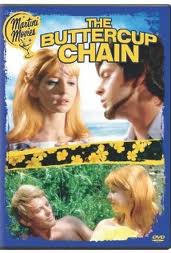
THE BUTTERCUP CHAIN
UK, 1970, 95 minutes, Colour.
Hywel Bennet, Leigh Taylor- Young, Jane Asher, Sven Bertil Taube, Clive Revill.
Directed by Robert Ellis Miller.
The Buttercup Chain is a depressing film. It takes four of today's young people, romanticises them, shows them as fairly free and permissive in behaviour and morals. But it does not let them get away with it. They grow older, the romance sours; some of them take on adult responsibilities, and loves and friendships break until they all seem to be left with nothing. The four young stars act their parts well, although Hywel Bennet seems to have been too often cast as an enigmatic add character. The director is Robert Ellis Miller, whose film previous to this was The Heart is a Lonely Hunter. If the film is seen, it needs discussion, firstly to ask why the romantic, permissive life is so alluring (and in the film it is presented as alluring) and then why it breaks down, and it if inevitably must break down. The other major point for discussion is the moral anchor of the film ? whether it is just hollow within and there is no definite point of view or whether some actions can be considered good and others bad and whether the film's screenplay provides adequate criteria.
1. Did you like this film? Was it a happy film?
2. What was revealed about France and his cousin during the credits? How close were they?
3. What kind of a girl was Margaret?
4. What kind of a girl was Mannie? How was she drawn into the chain?
5. How was Fred drawn into the chain?
6. Who managed the lives and affairs of the four?
7. What was the mood of the Spanish sequences ? holiday, permissive love, yet the enigmatic role of France? Why did the holiday end on a bitter note?
8. How had the four changed by the time they returned to England?
9. Did they expect Mannie to marry Fred? Did she really love him? What was France's reaction? What was Margaret's?
10. What was George's role? What was the significance of the wedding breakfast?
11. How did Mannie's child change the four?
12. How did Rome affect Margaret? Did she change for better or worse?
13. What impact did the Swedish sequences have ? the infidelity, the irresponsibility and the baby's death, France's reaction?
14. what was the significance of the showdown in Sweden ? Mannie's lustful frenzy, Fred's sorrow and Margaret's?
15. Why did Mannie go back to George? What future did they have?
16. What happened to Margaret and France?
17. How was this film one of maturing and growing up? How much did each member of the chain change? How did the mood of idyllic joy and permissiveness change to an ending of bitterness and disillusionment?
18. Were these four typical of young people, their behaviour, attitude and mistakes? Why?
Published in Movie Reviews
Published in
Movie Reviews
Tagged under
Saturday, 18 September 2021 19:45
Butterfly
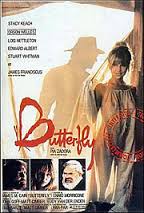
BUTTERFLY
US, 1982, 103 minutes, Colour.
Pia Zadora, Stacy Keach, Orson Welles, Lois Nettleton, Edward Albert, James Franciscus, Stuart Whitman.
Directed by Matt Cimber.
Butterfly is based on one of James N. Cain's lesser-known short novels. He achieved great reputation with The Postman Always Rings Twice and Double Indemnity. These have been filmed a number of times. Butterfly is in the vein of Bob Rafaelson's version of Postman with Jack Nicholson and Jessica Lange. It is set on the Nevada/Arizona border in the late 1930s. There is a great deal of atmosphere about the desert mining community. Stacey Keach is excellent brooding as the central character and sex symbol Pia Zadora is effective enough as the tantalising, Lolita figure.
There is a good supporting cast of stars headed by Lois Nettleton as Belle and Orson Welles with a caricature of a judge. Themes of community, relationships, conscience, legality and morality are to the fore. As with Cain's other stories, there is a court sequence and the irony for the audience is that the accused are not necessarily guilty of the legal accusation but nevertheless are morally guilty. There is a sombre ending. The heroine also sings a theme song for the final credits. An offbeat film, especially since the moral focus is ultimately on incest. It does not compare with other versions of Cain's novels, but it is nevertheless interesting and worth reflecting on.
1. The popularity of the work of James M. Cain? As representing facets of American lifestyle, moral issues, conscience and guilt? His representing the '30s? His isolated communities, the relationships between men and women, basic experiences, conscience, religion, passion and violence? The law, morality and guilt?
2. Critics comment on the Greek tragedy style of Cain's work. The basic tragic patterns in this story? Fate, freedom? Passion and violence, religious values? The embodiment of Greek tragic issues in the American '30s?
3. The background of the Nevada/Arizona border in the '30s? Visual impact, landscapes, the hills, the deserts, the roads, mines? Isolation? The town, the church, the court, the shops and bars? A microcosm of the United States?
4. Men and women in this isolated society? Their lifestyle, values? Drives, motivation? Love and marriage, greed, desertion, selfishness? The repercussions for the next generation? The guilt of the parents affecting their children? Change, revenge? Seduction? Men and women using one another, deadly games? Freedom, control or fate?
5. The significance of the title - obvious reference to Kady? The birthmark on Moke, Lamey, Danny? The impact of the revelation of the birthmark for Jessie? For the Gillespies? For Kady? For the judge? The butterfly as symbol, fact?
6. The stances of the film on morals and law? The law as represented by the judge? His administration, venal aspects, lustful, especially when eyeing Kady? His judgments on the brawl, prison or fines? His attitude towards incest? Quoting the Bible, public opinion? His expectations for judgment on incest? The way the law was used? Legal guilt not admitting personal issues and circumstances? The breaking of the law to be equated or not with breaking moral codes? The audience being asked to judge Jesse and Kady?
7. The portrait of Kady: her appearance, dress, age, her getting a lift, tantalising the driver and then humiliating him, encountering Jesse, teasing him? Her talking and then revealing she was his daughter? His explanation of things to her? Her continual provocation, how intentional: her looks, clothes, dressing and undressing, the bath and the soap, physical contact? Her awareness of the repercussions on Jesse? Audience response to the suggestions of an incestuous relationship? Her mother and her relationship with her, her bringing up? Her dislike for Moke? Her love for Wash and the resentment against him after his not marrying her? Her reliance on Janey looking after the baby? Her support? Her hostility towards the Gillespies - wanting to mine the silver, making Jesse take the silver - the first step in seduction? Her enjoyment of the shopping for the dress, the dancing in the cafe, the brawl, the court case? The reconciliation with Wash? The build-up to the marriage and her exhilaration? A girlish kind of joy? Belle and her death? The repercussions for Kady? Her disappointment with Wash not turning up for the marriage? Her determination to avenge herself? The build-up to the incest sequence - credibility, motivation, passion and feeling? The transition to the court case? Her behaviour, attitude? The truth? The discovery about the identity of her father? Her going with Wash ? the right decision? Her resentment towards Jesse, love for him? The butterfly as symbol of Kady?
8. Jesse and Stacey Keach's performance? Domination of the film? His lonely life, the mine and his sense of responsibility in guarding it? His caution at Kady's arrival? Telling her the story, discovering the truth? His attitudes towards the law, loyalty to the Gillespies? His religious background and churchgoing? The sexual attraction to Kady? His caution? Intimate scenes between them. a certain voyeurism? His treatment of her? The coming of Janey with the baby? His attitude towards the Gillespies and his being seduced by Kady to mine the silver? The innuendo for incest? The sequence in the town, the buying of the dress, dancing in the cafe. the brawl? The court scene and the penalty? The importance of Belle's coming, his seeing her after so many years, clash and antagonism, love and memories? The reaction to Moke? Her death and the puzzle of her stabbing Moke? The funeral and his realising that Moke was robbing the mine? The confrontation, Moke's provocation of cowardice, seeing the butterfly emblem, anger and murder? The irony of Lamey knowing this? His guilt and his unwillingness to face it? His unwillingness for the marriage to go ahead? Possessiveness? His visit to the Gillespies and the lies? His return home, the sexual encounter with Kady? The irony of Lamey being responsible for the arrest? The interrogation in the court? The legal issues and the judge's attitude? moral issues? His trying to protect Kady? Telling her the truth? Her discovery that he was not her father? Her choosing to go with Wash? His farewell? The irony of Lamey following him - to kill him? How well developed a character? In his context? Principles, passion, values? Their being challenged? His hurting and exploiting others? The eruption of violence? Guilt and atonement for guilt?
9. The characterisation of Belle: the discussion about her, love for Jesse. leaving with Moke, bringing up the children, her bad example? Kady like her mother? Her arrival, illness, drinking? Collapse? Clashes? Wanting to tell Jesse the truth? Stabbing Moke? Her reasons for this? Her funeral - the occasion for Moke to rob the mine? An effective character sketch?
10. Moke as Jesse's rival. taking Belle away, his arrogance and swagger? His being stabbed by Belle as she died? His greed? Confrontation with Jesse? Taunting him with having no guts? The discovery of the birthmark? Jesse's anger and his death? The sketch of Lamey and his snooping on Jesse and Kady? Knowing about the death of Moke? His testimony in court? His having the birthmark? His driving after Jesse to kill him?
11. The Gillespies and their wealth? Wash and his weakness? Abandoning Kady? Change of heart? His sharing experience at Jesse's home? The plan to marry Kady? Jesse's story? Wash's weakness and not going to Kady? The sketch of the parents and their disdain of the situation? Making the best of it? Glad at hearing the truth? Wash's final decision to act, taking Kady and the baby away? What future?
12. Janey and her resembling her father, her devotion to Kady and the baby, her mother's death?
13. The sketch of the town: the shops, cafe, dances, fights, the court?
14. The sketch of the judge, Orson Welles caricature? His administration of justice, his leering at Kady, his administration of the court? His stating the law? His attitudes towards the incest? The confusion? His statement of attitudes?
15. The theme of incest? A traditional taboo? Scripture references? The reasons in society for condemning incest? The explanation? The moral situation, legal situation. Audiences judging the situation, judging the characters?
16. The film as presenting a microcosm of the United States? James M. Cain's tragic issues Americanised?
Published in Movie Reviews
Published in
Movie Reviews
Tagged under
Saturday, 18 September 2021 19:45
Bye, Bye Braverman
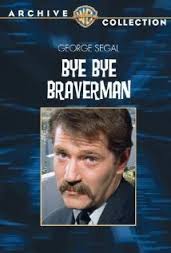
BYE, BYE BRAVERMAN
US, 1967, 93 minutes, Colour.
George Segal, Jack Warden, Joseph Wiseman, Sorrell Booke, Godfrey Cambridge, Jessica Walter, Phyllis Newman, Zohra Lampert, Alan King.
Directed by Sidney Lumet.
Bye, Bye Braverman is a wry comedy about Jews in New York. Sidney Lumet, three years earlier, had given the world a suffering Jew in New York, Sol Nazermann, The Pawnbroker. Now he shows us the ordinary, the human side of the Jews in a comedy that is touching, funny and sad. These Jews are American Jews with their characteristic ways of expressing themselves and modulation. They have been born and have grown up in New York, are now in middle age and one of their friends has died. We catch them on a Sunday in the middle of life, see them meet one another again and then part. These vignettes of life are excellent and help us to understand ordinary men better. At times the comedy becomes farcical, but by and large this is a comedy about life and death.
Sidney Lumet (with Boris Kaufman as his director of photography) has filmed often in New York - The Pawnbroker, The Group, The Anderson Tapes, Dog Day Afternoon. Here the city is one of the characters as well. The humour might be too localised for many audiences, but for those who like an intelligent comedy, this is worthwhile.
1. Was this film too narrow in its range, interest and humour for a general audience? Was it made rather for a Jewish audience?
2. What dimension did the stills behind the opening credits give to the film ?children growing up in a particular period in New York?
3. We are told that New York is where Leslie Braverman's friends live. How did the New York environment come across in the film, its details, its moods e.g. on the way to the funeral?
4. The film was about a cross-section of ordinary men: man, Jewish, New Yorker, American. What did the film tell you about each? Morrie, middle aged fundraiser, his wife and clashes, Inez, too soft, his imagination (he is always dead and wanting to be thought well of). How friendly was he to Leslie Braverman? Why did he want to go to his funeral? The reaction of Inez and her child. Holly Levine, how was he being satirised, what was being satirised? He is clean but sterile, no wife, uncreative, fastidious, pedantic? Felix, Jewish-conscious, grudges, self-made man, self-centred against his wife and son, his treatment of his son and lack of sympathy, unimaginative, his anti-German remarks, his speaking to God? Why did he like Leslie Braverman? the sociologist, intelligent, using jargon in his relationships with his girlfriend, his remarks about his mother, selfish and calculating, yet pleasant, his relationship to his girlfriend? Why did he like Leslie Braverman?
5. What was the effect of death on each of the friends? What did they first think of e.g. Morroe and the $137? friendship, the return to the past, themselves and their lives (and death)?
6. Why did Morroe not succeed in making communication with the men on the bus? Why was he successful only in his imagination - the men on the bus, the Rabbi, his wife and the tombstone?
7. How did the four friends communicate with one another - their conversation and banter in the car?
8. What was the significance of Holly's hitting the cab and the dialogue with the cab driver? What point was made in this sequence?
9. Did you like the funeral sequence? What points were being nude about death, life, grief? Why did the friends react as they did? What was the point of the Rabbi's talk?
10. What was the significance of the sequence in the cemetery, their discussion about the living and the dead, Morroe's soliloquy surrounded by headstones? Did he explain himself and his life well?
11. How did they all feel as they went home? What bonds had been broken? How had they realised that time was passing and they were changing and getting older?
12. What was the significance of Morroe's return home and the talk about the jello? Why did he cry at the end? Whom for? Why was the final still shown at the end?
13. How did the music contribute to the mood of the film?
14. Why was this comedy made? Did it help you to understand human nature better?
Published in Movie Reviews
Published in
Movie Reviews
Tagged under